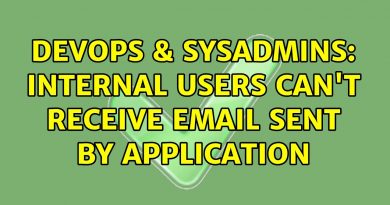Configure Apache Based DNF/YUM Server in RHEL 8 (CentOS8) | Setup Web DNF Repository | Nehra Classes
Configure an Apache-Based YUM/DNF repository on RHEL 8 (CentOS 8):
==
Step 1: Mount the Red Hat Enterprise Linux 8 media
# mount /dev/cdrom /mnt
Step 2: Create a local YUM repository from the mounted media
Move the existing repo files located in /etc/yum.repos.d:
# mv /etc/yum.repos.d/*.repo /tmp/
Create a directory for the repo:
# mkdir /local_repo
Create the new local repository’s configuration file, local-dvdrom.repo, under the /etc/yum.repos.d directory and set the permissions:
# touch /etc/yum.repos.d/local-dvdrom.repo
# chmod u+rw,g+r,o+r /etc/yum.repos.d/local-dvdrom.repo
Step 3: Copy media content to the local directory
Copy the ISO files locally under the /local_repo directory:
# cd /mnt
# tar cvf – . | (cd /local_repo/; tar xvf -)
Verify that the files were copied using:
# ls -l /local_repo/
Step 4: Configure the local YUM/DNF repository
Edit the repo configuration file we created earlier:
# vim /etc/yum.repos.d/local-dvdrom.repo
[LocalRepo_BaseOS]
name=LocalRepo_BaseOS
metadata_expire=-1
enabled=1
gpgcheck=1
baseurl=file:///local_repo/BaseOS/
gpgkey=file:///etc/pki/rpm-gpg/RPM-GPG-KEY-redhat-release
[LocalRepo_AppStream]
name=LocalRepo_AppStream
metadata_expire=-1
enabled=1
gpgcheck=1
baseurl=file:///local_repo/AppStream/
gpgkey=file:///etc/pki/rpm-gpg/RPM-GPG-KEY-redhat-release
Check the Repository:
# yum repolist
Install the required packages for creating, configuring and managing the local repository:
# yum install createrepo yum-utils
Finally, run the createrepo command:
# createrepo /local_repo/
Step 5: Test and verify your local repository
In this step, you clean up the temporary repository files and verify that the local repository is enabled:
# yum clean all
# yum repolist
Verify that the local repository was created:
# ls /local_repo/repodata/
Disable Subscription Warning:
# vim /etc/yum/pluginconf.d/subscription-manager.conf
[main]
enabled=0
Install Apache:
To install the httpd (Apache) package using YUM:
# yum install httpd
Once Apache is installed, start and enable the httpd service to auto-start at boot and verify its status using the following commands:
# systemctl start httpd
# systemctl enable httpd
Check the Status:
# systemctl status httpd
Configure the firewall so that Apache can be reached:
# firewall-cmd –zone=public –permanent –add-service=http
# firewall-cmd –zone=public –permanent –add-service=https
# firewall-cmd –reload
You can now verify that your Apache server is up and running by going to the localhost URL on your web browser.
The default Apache web page http://192.168.1.109/
To configure Apache, open the configuration file:
# vim /etc/httpd/conf/httpd.conf
DocumentRoot “/local_repo”
Directory “/local_repo”
Options All Indexes FollowSymLinks
AllowOverride None
Require all granted
/Directory
Now, start the Apache service again and test its status:
# systemctl restart httpd
# systemctl status httpd
Remove the welcome page so you can serve the repo files:
# rm -rf /etc/httpd/conf.d/welcome.conf
Test httpd and restart Apache:
# httpd -t
Change permissions and set SELinux:
# setfacl -R -m u:apache:rwx /local_repo/
Check if SELinux is enforcing:
# getenforce
If it is Enforcing, type:
# chcon -Rt httpd_sys_content_t /local_repo/
If SELinux is not set to Enforcing, then the files will not serve from the repo.
# setenforce enforcing
———–
Set up the client:
Now, to configure the Red Hat Enterprise Linux 8 client machine’s repository.
Add the repo
On the client machine, add the local repos from the server to the client’s YUM configuration:
# vim /etc/yum.repos.d/local-rhel8.repo
[LocalServerRepo]
name=LocalServerRepo
enabled=1
gpgcheck=0
baseurl=http://192.168.1.109
Verify the configuration:
# yum repolist
Test the LocalServerRepo by installing a package.
# yum install vsftpd -y
Note: Add square brackets in httpd.conf directory.
(Source: https://www.redhat.com/sysadmin/apache-yum-dnf-repo)
===
Thanks for watching the video. If it helped you then, please do like & share it with others as well.
If you like our hard work then do subscribe to our channel & turn on the bell notification for latest updates.
===
Our Some Popular Videos:
Yum Server RHEL 7:
DNF/Yum Server RHEL 8:
Migrate LVM:
LVM Snapshot:
===
Contact Us:
Vikas Nehra’s Twitter Handle:👇
http://bit.ly/VikasNehraTwitterHandle
Registration:👇
http://bit.ly/NehraClassesRegForm
Twitter Handle:👇
http://bit.ly/NehraClassesTwiiterHandle
Facebook Page:👇
www.facebook.com/nehraclasses
Instagram:👇
https://www.instagram.com/nehraclasses/
Webpage:👇
http://bit.ly/NehraClassesWebpage
Telegram Channel: 👇
https://t.me/NehraClasses
WhatsApp Us: 👇
https://bit.ly/2Kpqp5z
Email Us:👇
Email: nehraclasses@gmail.com
===
©COPYRIGHT. ALL RIGHTS RESERVED.
centos 8



